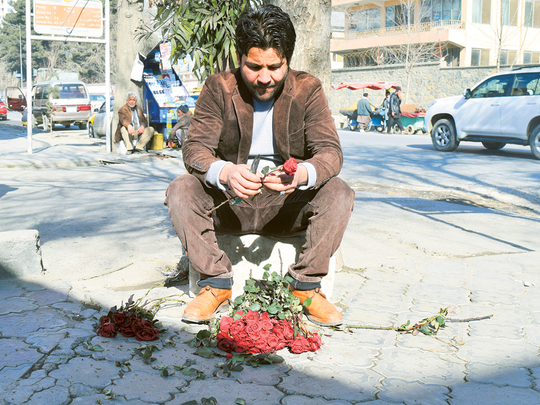
Kabul: Most people across Afghanistan may be unaware of Valentine’s Day, but many youths in urban areas plan to celebrate it despite restrictions.
Some plan to send flowers or cards to their loved ones, while others plan to spend their money on their mobile phone.
“Yes, I am very much excited to celebrate Valentine’s Day with someone I love here [in Kabul’,” said Aisha, a law student in the capital.
“I would love to receive some special gifts from him, or a basket of flowers, which is more common here, or at least a rose,” she said.
Militants in Muslim Afghanistan may be at war with the West, but many in the new generation seem keen to embrace foreign lifestyle choices. Valentine’s Day is the latest addition to the list.
Afghan boys and girls said it is a good opportunity to express their feelings for their sweethearts.
Shopkeepers on Kabul’s popular Flower Street are preparing for an influx of youth business this year.
One vendor said he would cover the footpaths in front of his shop with rose petals to welcome couples.
Another shopkeeper said he would decorate his establishment with red roses and other decorative gifts, “as a sign of love.”
“For this day we bring balloons with the words “I love you” inscribed on them,” said Shamsullah Amiri, who has been in the business for the past nine years.
“We also get more greetings cards, and several different types of roses, which come from the Netherlands, Iran and elsewhere for our customers.”
Teenage boys and girls go to his shop and buy fresh bouquets of flowers and other presents for their loved ones.
“Every year our customers who are celebrating this day, mostly teenagers, have been increasing,” Amiri said.
“Last year, I sold all the fresh roses I bought. I wasn’t expecting this, but it happened,” he said.
But Hamid, a 25-year-old flower seller, predicted that he would sell less this year because of the withdrawal of the foreign troops.
“I don’t expect a big boom on this Valentine’s Day. Because most of our customers were foreigners and now they have gone back to their countries,” he said.
“However, it has spread among young Afghans as well.”
Going out on an actual date is tricky in Afghanistan, where unmarried couples are seldom seen together in public.
Rahimullah, a youth volunteer, said he would not be able to meet with the girl he likes in public, even though the feeling is mutual.
Risk
“I cannot go out on a date like in the movies,” he said.
At times, such romances have ended in tragedy in Afghanistan.
“I know the risk of being involved with the opposite sex. But when you are young, your heart does not listen to your head,” he said.
Many young Afghans have gravitated toward universities, cultural centres, shops and restaurants far out of sight from their relatives.
Rahimullah said he plans to go with a group to a restaurant on Valentine’s Day, so it is not obvious.
“I fell in love with a girl. But she got married to someone else. It was tragic,” said Hamid Tanha, a 31-year-old shopkeeper in Kabul.
“Since then, I promised to never fall in love again. And I am still single,” he said, exhaling heavy smoke from his cigarette.
He said the ethnic and language differences between the two families cost him his love.
Baryalai Fitrat, a professor of sociology at Kabul University, said celebrating Valentine’s Day in a peaceful and friendly environment would help the community repair the social fabric.
“If our love is bound according to our community’s ethical and cultural framework, then celebrating this day would help establish relationships with one another,” he said.
Many youngsters are taking refuge in the mobile phone, one of the success stories of the last 13 years of development aid.
Most Afghan youths in the cities have access to phones, and many appear to have found love.
Nasir Yousifzai, 27, said many relationships nowadays in Kabul were due to mobile phones and social networks.
“Boys and girls cannot talk to each other in a public place. So they use social media and phones.”
Yousifzai is engaged to a girl from another province. He hopes to Skype with her on Valentine’s Day.
“Technology has made our life easier,” he said.












